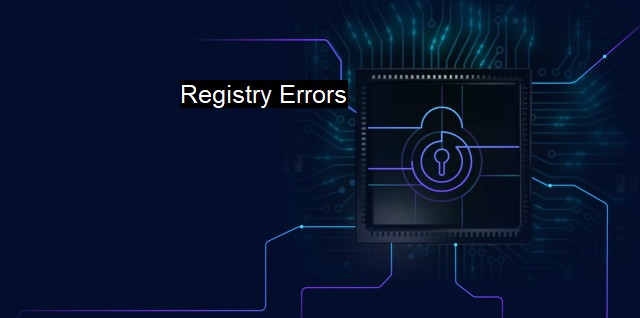What are Registry Errors?
The Limitations of Antivirus Software in the Face of Registry Errors: Addressing Vulnerabilities in Modern Computing Devices
'Registry Errors' represent one such anomaly that can either merely slow down a system or lead to severe and complex issues. But before delving into the intricacies of one, it's essential to understand what registry means in the context of the computer system.The registry is akin to a digital ledger on your computer, logging extensive information about configurations, settings, applications, kernel, hardware, and many more elements specific to your system. Your computer consistently references the registry while operating, modifying data as per software installations, system preferences, user data, etc. Given its extensive use, the registry can, over time, accumulate obsolete, fragmented, and corrupt entries, leading to what experts term as ‘Registry Errors’.
Registry-error broadly refers to the anomalies that transpire due to invalid, outdated, or fragmented entries lodged in the registry. These incoherent entries can originate through diverse means - frequently installing/uninstalling programs, security breaches, or even basic software overheads.
A frequent occurrence in Windows systems, registry errors significantly impact system efficiency and operation, echoing into slowed performance, frequent crashes, and sometimes even critical system failures. In the cybersecurity context, such errors can form an easy gateway for malicious software to sneak into more secure system sections, thus posing an elevated risk to computer systems regarding personal data and valuable information.
The occurrence of registry errors can potentially make computer systems prone to virus attacks. Many malicious software and threats, otherwise known as malware, deliberately exploits these registry errors to gain unauthorized access. Malware likes trojans, worms, spyware, and adware use these loopholes in the registry to invade the system, capture personal information, disrupt operation, or simply to propagate to other computers in the network, unbeknownst to users.
Antivirus software, therefore, plays a vital role in detecting and rectifying such registry errors. It acts as the first line of defense against potential threats by identifying the registering errors indicative of possible malware activity or contamination. Various antivirus solutions come integrated with scanners that sifted through registry data, highlighting entries that could link to corrupted or infected files.
Upon detection, the antivirus can either neutralize them or thoroughly remove them, bringing the registry to a cleaner disposition. While antivirus software substantially reduces the threat posed by registry errors, it isn't entirely infallible. As malware evolution continues to outpace antivirus development, newer, more diverse types of threats are being stylized to evade detection.
An updated operating system, cautious internet usage, scheduled system audits, backup and recovery plans, are part of the comprehensive solution set to keep registry errors at bay. Users can also input manual cleaning through a 'Registry Cleaner'; it may not always present the best solution as it might accidentally remove useful registry data in the process.
Understanding and addressing registry errors contribute to a significant dimension in maintaining robust cybersecurity practices. Registry errors, if left unnoticed, can pave the way for severe cybersecurity breaches. when appropriately managed with useful tools and robust antivirus software, the risk posed by registry errors can be significantly mitigated, helping maintain a healthy high-performing computer system.

Registry Errors FAQs
What are registry errors?
Registry errors occur when there is a problem with the Windows registry, which stores all the configurations and settings for your computer's operating system. Registry errors can cause your computer to malfunction, slow down, or crash.How do registry errors affect cybersecurity?
Registry errors can affect your cybersecurity by making your computer more vulnerable to viruses, malware, and other cyber threats. A compromised registry can allow cyber-criminals to gain access to your system, steal your personal information, and cause other forms of damage to your computer.Can antivirus software fix registry errors?
Yes, antivirus software can fix registry errors as part of its regular scanning and cleaning process. However, not all antivirus software is capable of fixing complex registry errors, and some errors may require manual intervention by a professional.How can I prevent registry errors from occurring?
You can prevent registry errors from occurring by performing regular maintenance tasks such as updating your operating system, running a reputable antivirus program, keeping your software up to date, and performing regular system backups. Additionally, you should avoid installing software from untrusted sources and be cautious when downloading files or clicking links from unknown sources.| | A | | | B | | | C | | | D | | | E | | | F | | | G | | | H | | | I | | | J | | | K | | | L | | | M | |
| | N | | | O | | | P | | | Q | | | R | | | S | | | T | | | U | | | V | | | W | | | X | | | Y | | | Z | |
| | 1 | | | 2 | | | 3 | | | 4 | | | 7 | | | 8 | | |||||||